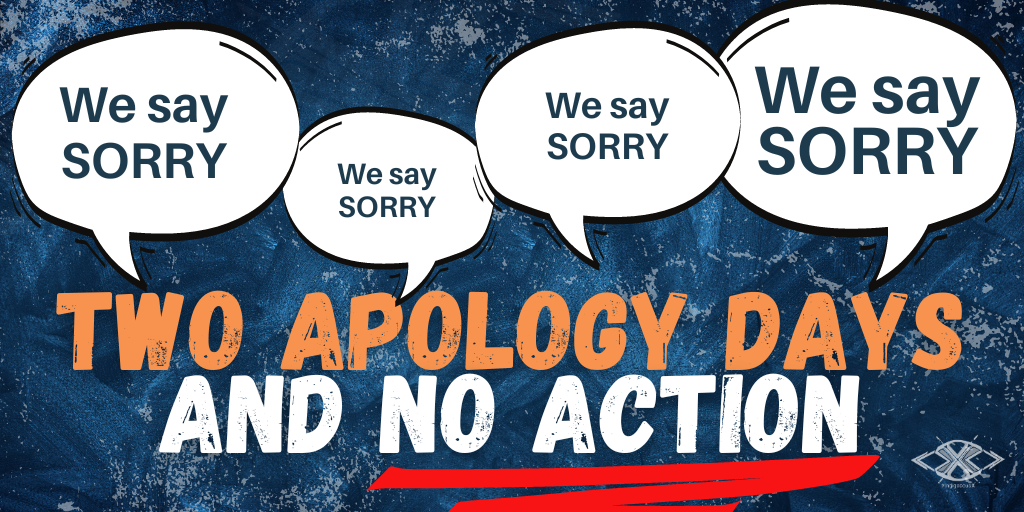Two apology days and no action

On May 26, 1997 the final report of the National Inquiry into the Separation of Aboriginal and Torres Strait Islander Children from Their Families, called the Bringing Them Home report, was tabled in Parliament. The report proposed a list of 54 recommendations, including for the Prime Minister to issue a formal apology to the Stolen Generations on behalf of the federal government.
The then-Prime Minister John Howard refused, stating he “did not subscribe to the black armband view of history.” In 2007, however, aspiring Prime Minister Kevin Rudd promised he would not only apologise on behalf of the government, but that it would be his first act as Prime Minister should he be elected.
After Rudd was elected, on 13 February 2008, he opened parliament’s first sitting day with his apology. Rudd invited many guests who were members of the Stolen Generations and their families for the occasion. The emotion of the occasion was high, the power of something well overdue finally happening hung in the air.
He opened strong with, “We apologise for the laws and policies of successive Parliaments and governments that have inflicted profound grief, suffering and loss on these our fellow Australians.
We apologise especially for the removal of Aboriginal and Torres Strait Islander children from their families, their communities and their country.”
These particular words were powerful in light of the long period in which John Howard was Prime Minister and held strong in his frequent denials of the truth of history and avoidance of responsibility.
“Today’s apology, however inadequate, is aimed at righting past wrongs.” Rudd stated,“It is also aimed at building a bridge between indigenous and non-indigenous Australians – a bridge based on a real respect rather than a thinly veiled contempt.”
“…It is for the nation to bring the first two centuries of our settled history to a close, as we begin a new chapter. We embrace with pride, admiration and awe these great and ancient cultures we are truly blessed to have among us cultures that provide a unique, uninterrupted human thread linking our Australian continent to the most ancient prehistory of our planet.”
February 13 this year marks 16 years since the then Prime Minister Kevin Rudd apologised to members of the Stolen Generations on behalf of the government. Grandiose statements were made about how the painful and cruel policies were to be a thing of the past. I remember sitting and watching the television in awe of the grace of members of the Stolen Generations present. They seemed to be full of hope that this man, this government, would change the way this country did things.
24 years on, what has changed?
Recently, two significant reports signal that there has been little change to how laws are implemented when we are on the receiving end of them.
In 2019, a landmark review of 1,200 case files of children in out-of-home care in New South Wales was headed up by UNSW Pro Vice Chancellor Megan Davis. Her Family is Culture report revealed unethical practices, a culture of non-compliance, and a significant lack of accountability in the NSW child protection system. The report’s findings described a system not only in deep chaos, but often in breach of its own policies. The report also found at times “children who did not appear to be at risk of harm were removed from their families” by department caseworkers who “regularly” provided “false or misleading” evidence to the children’s court.
The report made 125 recommendations, as well as over 3000 individual recommendations relating to the children whose cases were subject to review.
An assessment of progress of the government in implementing the recommendations to address the unethical practices and devastating results for Indigenous children has been lacking with no sense of urgency from the government. The NSW Government conducted a review of the report in 2022 to track the progress of the report’s recommendations being implemented. The review found considerable recommendations in key areas still had not been implemented.
In 2019/20, 952 Aboriginal children across NSW were removed from their families, a 2.6% increase on the year prior. In total, there were 6,688 Aboriginal children in what is known as “out-of-home-care” – about 41% of the total number of kids in the system. This is despite Aboriginal children only making up 6% of Australia’s under-18 population.
The Family Matters 2023 report, released by Secretariat of National Aboriginal and Islander Child Care (SNAICC), found 21,523 Indigenous children in Australia were in out-of-home care as of June 30, 2020, which represents one in every 15.6 First Nations children living in Australia.
The report also found 79 per cent, about 17,000 children, lived permanently away from their birth parents, with less than 15 per cent being reunified with their families. This confirms the trends are worsening. In fact, it says ‘in the Northern Territory, 64% of Aboriginal children in care are not placed in accordance with the Child Placement Principle – this statistic is getting worse and there is no accountability for the Department’s non-compliance with their own legislation.’
The Child Placement Principle was developed to ensure Aboriginal children are not disconnected from culture, Aboriginal and Torres Strait Islander people’s rights are protected, and they have a self determined way to navigate child protection systems.
These statistics are glaring, but they are also our people, continuing to have pain and trauma inflicted upon them at the whim of the government who, by the findings of the Family is Culture and the Family Matters reports, cannot even follow the parameters of the assessments of child removal nor the legislation.
Since the 2008 Kevin Rudd apology, the government has enacted policies that add to the root cause of the majority of the social issues facing Indigenous communities – poverty and lack of opportunity. We have seen the expansion of the Northern Territory Intervention, multiple (predominantly Indigenous) communities being forced to use cashless welfare cards and working for below minimum wage in CDP programs. We have seen rates of Indigenous imprisonment at levels not seen since South African apartheid and child removals at rates that gave rise to the Inquiry that informed the Bringing them Home Report.
This country’s history of child removals continues and increases, amidst the truth unfolding of what has happened in the homes so many of the Stolen Generations were sent to. Cootamundra Girls Home, Kinchela Boys Home and Bomaderry Infants Home are being investigated with funding from the NSW government. This was in response to a report presenting findings from ground-penetrating radar on the grounds of Kinchela Boys Home by experts. These findings revealed “signal patterns that in other contexts have proven to be human burials” and cannot be explained by other information sources.
The investigation is expected to determine if there are other signal patterns on the two other sites and then they will be examined as to whether they are in fact unmarked graves. This is a distinct possibility given investigations elsewhere, such as Canada, have revealed unmarked graves of First Nations people and children.
The compounding trauma for the survivors of these abhorrent places is unfathomable. Yet, the survivors have been speaking out to ignorant ears about the atrocities that occurred,and the children that went missing…..remembered by mob and records lost or destroyed by the ‘protectorates.’
Kevin Rudd did admit to the ‘thinly veiled contempt’ towards Indigenous people by the government and non-Indigenous Australians in his apology speech 24 years ago.It seems things are not only not changing, but getting worse, given the contempt is no longer veiled – it is plain to see and felt painfully by Indigenous people.
We can only hold tight to the mob around us, support each other and push hard for the changes we want because we cannot expect it to come from anyone or anywhere but from us where we are.




